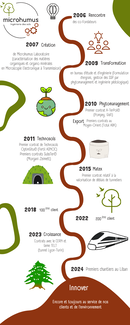History
The creation of Microhumus stems from a technology for characterizing organic matter developed by Geneviève Villemin and Françoise Watteau, researchers at the CNRS within the Centre for Biological Pedology.
Their encounter in 2003 with Professor Jean-Louis Morel, Director of the Soil and Environment Laboratory (UMR 1120 INRAE and University of Lorraine) and President of GISFI (Scientific Interest Group on Industrial Brownfields), followed by their 2006 meeting with Yann Thomas, an expert in organizational development, led to the founding of a pioneering company and leader in soil science engineering and the management of Contaminated Sites and Soils through Phytomanagement.
The technologies that Microhumus acquired through know-how valorization agreements and patents were further consolidated and expanded thanks to sustained internal Research and Development efforts. Microhumus has invested over 2 million euros in technologies that have enabled it to become an internationally recognized player in its field.
Microhumus was the first company in Europe to introduce Phytomanagement-based services for Contaminated Sites and Soils on the competitive market, directly targeting industrial clients without relying on grant-based funding.
Microhumus was also the first company to implement soil construction projects in the Middle East (Veolia, Total, Adnoc, etc.) with the aim of conserving irrigation water resources.
Today, Microhumus is recognized for its cutting-edge expertise and unique experience, and contributes to drafting a European guide for the restoration of degraded soils, and generates more than 50% of its business through exports.
